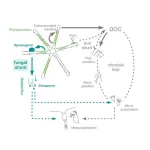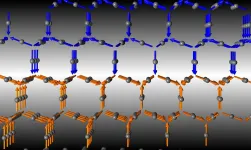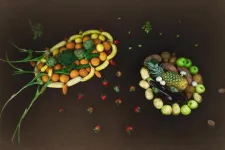(Press-News.org) ABSTRACT #9003
HOUSTON - Results from the Phase II cohort of the CodeBreaK 100 study showed that treatment with the KRAS G12C inhibitor sotorasib achieved a 37.1% objective response rate and 12.5 months median overall survival in previously treated patients with KRAS G12C-mutated non-small cell lung cancer (NSCLC), according to researchers from The University of Texas MD Anderson Cancer Center. The findings were presented today at the 2021 American Society of Clinical Oncology (ASCO) Annual Meeting and published in the New England Journal of Medicine.
Trial results indicated the targeted therapy was safe and tolerable in a heavily pre-treated patient population. The reported findings make sotorasib the first KRAS G12C inhibitor to demonstrate overall survival benefit in a registrational Phase II clinical trial.
Sotorasib was approved by the Food and Drug Administration on May 28, 2021, based on previously reported results from the CodeBreaK 100 trial. It is the first ever direct KRAS inhibitor to earn regulatory approval.
"KRAS has been an elusive therapeutic target for more than 30 years and was deemed 'undruggable.' This trial provides convincing evidence that mutant KRAS can be successfully and selectively targeted, resulting in meaningful prolongation of survival without compromising quality of life," said lead author Ferdinandos Skoulidis, M.D., Ph.D., assistant professor of Thoracic/Head & Neck Medical Oncology. "These results, along with the regulatory approval of sotorasib, represent a major landmark for patients with KRAS G12C-mutated lung cancer, who now have an approved targeted therapy option."
KRAS is the most common oncogenic driver in NSCLC, found to be mutated in 25-30% of patients. Sotorasib (AMG 510) is an irreversible and selective small-molecule inhibitor that targets a specific type of mutant KRAS protein called KRAS G12C, which is found in approximately 13% of all lung adenocarcinomas.
Study reveals rapid, durable clinical benefit with tolerable side effects
The single-arm, multi-center trial enrolled 126 patients with locally advanced or metastatic KRAS G12C-mutated NSCLC that had progressed after receiving immune checkpoint inhibitors and/or platinum-based chemotherapy. Sotorasib is a once-daily oral drug. The primary endpoint was objective response, assessed by independent central review.
The study found an objective response in 46 patients (37.1%), including four complete responses (3.2%) and 42 partial responses (33.9%). One hundred patients (80.6%) had disease control, with tumors shrinking or remaining stable. The median overall survival was 12.5 months, median duration of response was 11.1 months and median progression-free survival was 6.8 months.
Toxicities were manageable and primarily low grade, with only nine patients (7.1%) discontinuing therapy due to treatment-related adverse events. Of the 88 patients (69.8%) who had treatment-related adverse events, 25 (19.8%) were Grade 3 events and one (0.8%) was a Grade 4 event.
Study participants had a median age of 63.5 and were evenly split (50%) between men and women. The majority of patients (81.7%) were white, followed by Asian (15.1%), Black (1.6%) and other races (1.6%). Patients had received up to three previous lines of therapy and 96.8% had metastatic disease. A total of 81% of patients previously received both platinum-based chemotherapy and immune checkpoint inhibitors.
"In eight out of 10 patients, the tumor either shrank or remained stable, and these patients frequently saw improvement in their symptoms," Skoulidis said. "They're able to lead longer, active lives, because this targeted therapy is not associated with any major toxicities that would adversely affect the patient's quality of life."
Sotorasib effective in challenging subgroup and more research is underway
The study also analyzed responses among molecular subgroups and found particularly encouraging results among patients with STK11 co-mutations, without concurrent mutations in KEAP1. The 50% objective response rate and 11-month median progression-free survival in this group is notable because STK11-mutated tumors tend to respond poorly to standard of care therapies, including immunotherapy and chemotherapy.
Study investigators found response to sotorasib across other molecular subgroups, as well. The drug showed broad and consistent activity across patients with a wide range of baseline characteristics related to age, previous lines of therapy and other demographics.
"These study results are practice-changing, but our work isn't done," Skoulidis said. "Extensive efforts are underway to understand the determinants of response to sotorasib and to characterize the full spectrum of possible mechanisms of resistance. These results represent a foundational step in our progress against KRAS-mutant tumors and will likely be a stepping stone for even more effective combination regimens. The future looks promising."
INFORMATION:
Skoulidis reports research support from Amgen Inc. A full list of co-authors and their disclosures can be found in the paper. The study was supported by Amgen Inc. and in part by the National Institutes of Health Cancer Center Support Grant (P30 CA008748) at Memorial Sloan Kettering Cancer Center.
About MD Anderson
The University of Texas MD Anderson Cancer Center in Houston ranks as one of the world's most respected centers focused on cancer patient care, research, education and prevention. The institution's sole mission is to end cancer for patients and their families around the world. MD Anderson is one of only 51 comprehensive cancer centers designated by the National Cancer Institute (NCI). MD Anderson is ranked No.1 for cancer care in U.S. News & World Report's "Best Hospitals" survey. It has ranked as one of the nation's top two hospitals for cancer care since the survey began in 1990, and has ranked first 15 times in the last 18 years. MD Anderson receives a cancer center support grant from the NCI of the National Institutes of Health (P30 CA016672).
A research group of the Department of Pharmacy and Biotechnology of the University of Bologna analyzed more than one million SARS-CoV-2 genome sequences. This analysis led to the identification of a new variant that, over the past weeks, has been spreading mostly in Mexico but has also been found in Europe. Their paper published in the Journal of Medical Virology presented the so-called "Mexican variant", whose scientific name is T478K. Like other strains, this presents a mutation in the Spike protein, which allows coronaviruses to attach to and penetrate their targeted cells.
"This variant has been increasingly spreading among people in North America, particularly in Mexico. To date, this variant covers more than 50% of the existing viruses in this area. The ...
Tiny algae in Earth's oceans and lakes take in sunlight and carbon dioxide and turn them into sugars that sustain the rest of the aquatic food web, gobbling up about as much carbon as all the world's trees and plants combined.
New research shows a crucial piece has been missing from the conventional explanation for what happens between this first "fixing" of CO2 into phytoplankton and its eventual release to the atmosphere or descent to depths where it no longer contributes to global warming. The missing piece? Fungus.
"Basically, carbon moves up the food chain in aquatic environments differently than we commonly think it does," said Anne Dekas, an assistant professor of Earth system science at Stanford University. Dekas is the senior ...
Though it might seem inanimate, the soil under our feet is very much alive. It's filled with countless microorganisms actively breaking down organic matter, like fallen leaves and plants, and performing a host of other functions that maintain the natural balance of carbon and nutrients stored in the ground beneath us.
"Soil is mostly microorganisms, both alive and dead," says END ...
Like all metals, silver, copper, and gold are conductors. Electrons flow across them, carrying heat and electricity. While gold is a good conductor under any conditions, some materials have the property of behaving like metal conductors only if temperatures are high enough; at low temperatures, they act like insulators and do not do a good job of carrying electricity. In other words, these unusual materials go from acting like a chunk of gold to acting like a piece of wood as temperatures are lowered. Physicists have developed theories to explain this so-called metal-insulator transition, but the mechanisms behind the transitions are not ...
There's a lot of interest right now in how different microbiomes--like the one made up of all the bacteria in our guts--could be harnessed to boost human health and cure disease. But Daniel Segrè has set his sights on a much more ambitious vision for how the microbiome could be manipulated for good: "To help sustain our planet, not just our own health."
Segrè, director of the END ...
A new drug reduced tumor size in patients who have lung cancer patients with a specific, disease-causing change in the gene KRAS, a study found.
The results of the CODEBREAK 100 phase 2 clinical trial were presented June 4, 2021, at the American Society of Clinical Oncology (ASCO) annual meeting and published simultaneously in the New England Journal of Medicine. The efficacy and safety of the drug sotorasib, developed by Amgen Inc., was tested in patients with non-small-cell lung cancer (NSCLC) harboring a specific change, or mutation, in the DNA code for KRAS.
The KRAS mutant protein targeted in the study was p.G12C, in which a glycine building ...
Washington, DC--A team led by Carnegie's Thomas Shiell and Timothy Strobel developed a new method for synthesizing a novel crystalline form of silicon with a hexagonal structure that could potentially be used to create next-generation electronic and energy devices with enhanced properties that exceed those of the "normal" cubic form of silicon used today.
Their work is published in Physical Review Letters.
Silicon plays an outsized role in human life. It is the second most abundant element in the Earth's crust. When mixed with other elements, it is essential for many construction and infrastructure projects. And in pure elemental form, it ...
A study of more than 1,000 demographically representative participants found that about 22 percent of Americans self-identify as anti-vaxxers, and tend to embrace the label as a form of social identity.
According to the study by researchers including Texas A&M University School of Public Health assistant professor Timothy Callaghan, 8 percent of this group "always" self-identify this way, with 14 percent "sometimes" identifying as part of the anti-vaccine movement. The results were published in the journal Politics, Groups, and Identities.
"We found these results both surprising and concerning," Callaghan said. "The fact that 22 percent of Americans at least sometimes identify as anti-vaxxers was much higher than expected and demonstrates ...
Most Americans should get screened for colorectal cancer beginning at age 45 instead of age 50, according to new recommendations from the U.S. Preventive Services Task Force, which includes UVA Health's Li Li, MD, PhD, MPH. This recommendation applies to Americans without symptoms who do not have a history of colorectal polyps or a personal or family health history of genetic disorders that increase the risk of colorectal cancer.
Colorectal cancer is the third-leading cause of cancer death in America, according to the Task Force, and an increasing number of cases are being diagnosed in younger Americans. The Task Force notes that colorectal cancer diagnoses among Americans ages 40 to 49 increased by almost 15% from 2000-02 to 2014-16. Black ...
While previous research early in the pandemic suggested that vitamin D cuts the risk of contracting COVID-19, a new study from McGill University finds there is no genetic evidence that the vitamin works as a protective measure against the coronavirus.
"Vitamin D supplementation as a public health measure to improve outcomes is not supported by this study. Most importantly, our results suggest that investment in other therapeutic or preventative avenues should be prioritized for COVID-19 randomized clinical trials," say the authors.
To assess the relationship between vitamin D levels and COVID-19 ...



